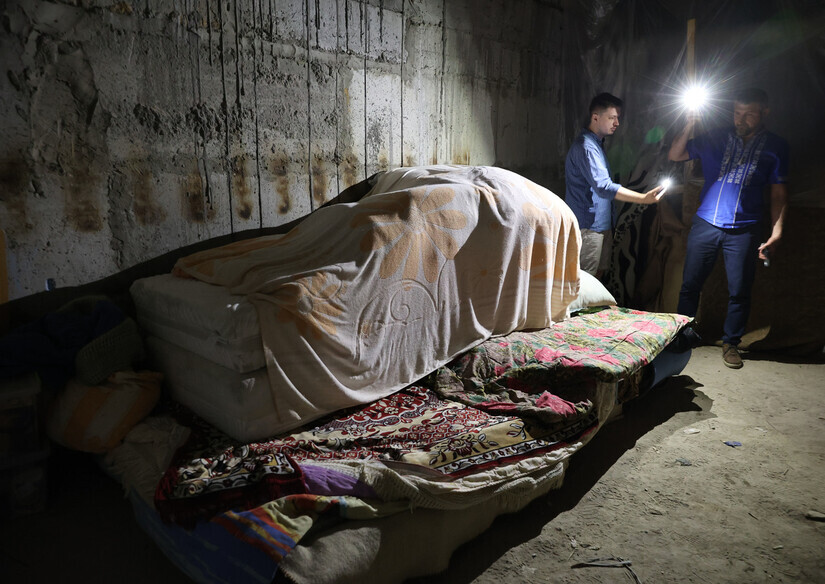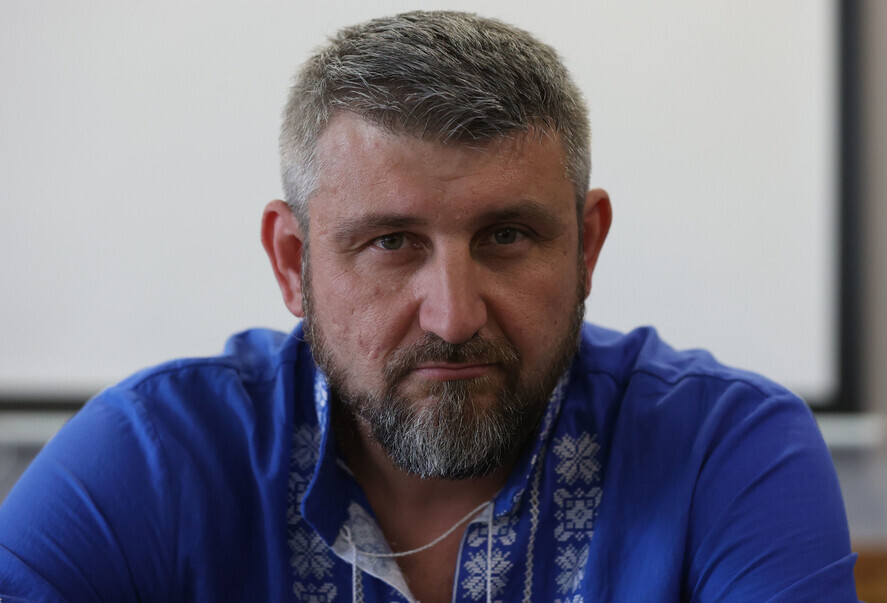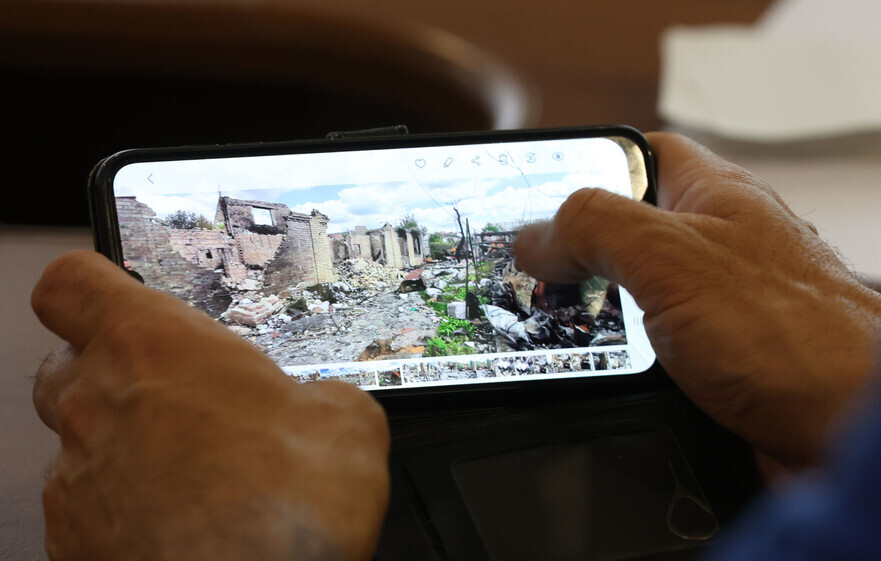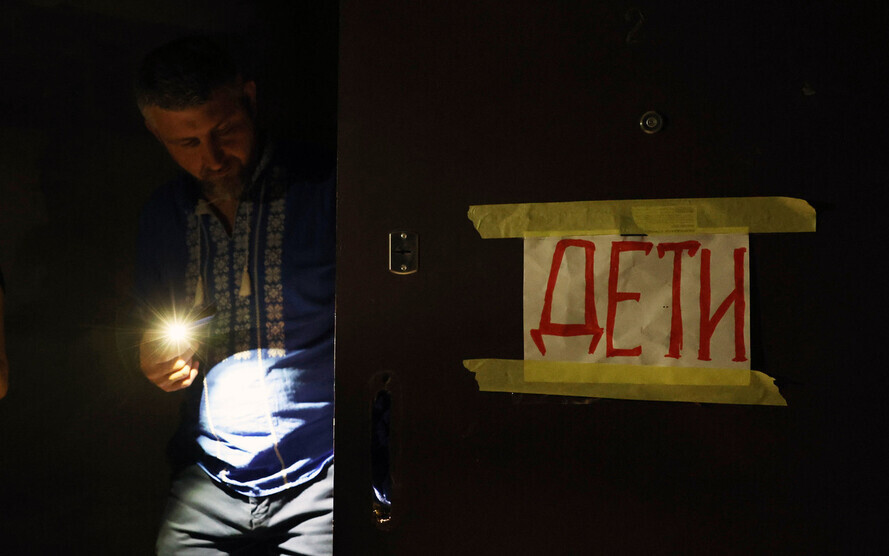hankyoreh
Links to other country sites 다른 나라 사이트 링크
[Reportage] Indelible scars of Russian brutality in Bucha

■On Feb. 24, 2022, Russia declared war against Ukraine and immediately launched an advance on its capital city of Kyiv. For the Russian army to successfully surround the capital, it would need to pass through the small city of Bucha, a strategic point on the road to Kyiv.
Russian forces occupied Bucha on March 3, remaining there for roughly a month before being driven out of Kyiv by a Ukrainian counteroffensive. After the Russians withdrew, hundreds of dead bodies were found in Bucha, sparking widespread outcry that Russian forces had massacred civilians. Calls for Russian President Vladimir Putin to be put before the International Criminal Court on war crime charges were heard around the world.
To remember what happened in Bucha, the Hankyoreh has been listening to and documenting eyewitness accounts from the city’s residents. The first of those witnesses is Dmytro Hapchenko, a 44-year-old employee of Bucha City Hall.■
Hapchenko, a staff member in charge of administrative duties at Bucha City Hall, was standing with his colleagues at noon on March 15, 2022, waiting for a bus to arrive in their small town.
At that point, a humanitarian corridor had been open for five days, since March 10, and the bus was scheduled to drop off relief supplies arriving along that corridor, after which neighborhood residents would be boarding the empty vehicle.
Just as Hapchenko was starting to wonder what was taking the bus so long, around 30 Russian soldiers climbed over City Hall’s wall.
“You there!” yelled one of the soldiers as they stopped Hapchenko and aimed a gun at his head.
“Do you work here?”
Dmytro’s close callWhen he spoke with the Hankyoreh on June 13, Hapchenko said he had known that moment would come at some point.
Russian soldiers had been hunting down officials in the Ukrainian government and military. Once they were found, they would be shot dead. He had heard about many people who had died just that way.
So when asked if he was a City Hall employee, he lied and said that he wasn’t. The Russian soldier demanded to see his phone and ID. Hapchenko knew that the Russians were rummaging through phones to see whether their owners were sharing photographs of soldiers or information on military movements.
He and his colleagues were prepared for this sort of situation. They had hidden or otherwise gotten rid of their regular smartphones and were carrying around old models that they could only be used to contact each other. Their smartphones contained too much information, including photographs and text messages.
Thanks to their forethought, the soldiers that day failed to determine the identities of Hapchenko and the other men. But they were visibly suspicious.

The Russians summoned six of the men there to City Hall’s courtyard: Hapchenko and another employee, three City Hall security workers, and one volunteer. Their hands were bound behind their backs, and they were ordered to stand facing the wall.
The soldiers proceeded to search the building thoroughly. Not long afterward, a Russian military truck pulled up. The soldiers began loading it with whatever they could find in the municipal building, from relief provisions like bread and noodles to electronics like laptops and printers.
Fortunately, Hapchenko and the other city employees had thought ahead for this too, having scattered provisions around the city just in case. Most of the provisions were being stored at a nearby hospital.
They knew that, for whatever reason, Russian soldiers typically don’t ransack or mess with hospitals. For the most part, they would only go there to request treatment or medication when one of their own was injured.
They remained standing there against the wall for what felt like an hour. After they’d finished their search, the Russian soldiers approached Hapchenko and the others again. They pulled down their caps to cover their eyes and began leading them off somewhere, not telling them where.
The destination turned out to be an apartment complex that the Russians were using as a base. They sat Hapchenko down on a bench just outside the building.
“Our superior officer will be coming to interrogate you,” a soldier told the group. Hapchenko and the others continued waiting late into the night, but the superior never arrived. Hapchenko’s hands were frozen stiff, but he said the cold wasn’t even on his mind.
The superior officer never did arrive, and the soldiers ended up letting him and the other men go.
“You can leave now,” they were told.
They’d been lucky. But it was too late to return home. That would have been dangerous.
When Russian soldiers encountered people on the street, they shot them. It didn’t matter who they were.
Six men like themselves roaming the streets late at night might be suspected of being local defense forces.
The Russian troops who were scattered throughout the village were ready to kill Ukrainian soldiers on the spot, no questions asked. They often brandished guns or fired at ordinary citizens spotted on the street.
Thankfully, the soldiers gave Dmytro and the others a choice. They could stay in the apartment basement until dawn, or they could leave right away. The six men hid in the basement that night, waiting for sunrise.
They didn’t leave the basement until 9 am, when they heard Russian tanks moving out of the base. They threw on their clothes and picked up some backpacks.
The idea was to look like residents who were going out to look for food. They needed an excuse for being out on the streets in the early morning, in case they ran into Russian troops.
After leaving the basement, the men chose a back alley where they could avoid Russian troops, instead of going down a main street. They slunk from house to house, as if playing a horrific game of hide and seek.
For about two weeks, they’d been delivering supplies to local residents while staying out of sight of the Russian troops. During that time, they’d learned how to remain inconspicuous.
Early in the morning, there was nobody at City Hall. Dmytro and the other men split up, returning to their own homes.

On Feb. 27 — three days after Russia declared war on Ukraine — Russian forces moved south through Belarus en route to the Ukrainian capital of Kyiv. The northwestern city of Bucha, about 30 kilometers from Kyiv, lay on the path of the Russian onslaught.
Ukrainian forces blocked the Russians’ first attempt to enter the city, but the Russians pushed through Bucha from the northwest on March 3. That was part of an operation to encircle Kyiv.
For about a month, until the Russians withdrew from Kyiv at the end of March, Bucha lay at the mercy of the Russian forces.
Dmytro will never forget the month when the Russian troops laid waste to Bucha. Several people he knew lost their lives during the occupation. One of them was a friend named Ruslan.
Around the time that Dmytro was detained by the Russian troops on March 15, Ruslan went out with his 14-year-old son Yura to find some food.
“You there! Where are you going?” a Russian soldier asked.
“We’re looking for bread.” But the answer did them no good.
Two gunshots rang out in the cold air.
Ruslan fell to the ground, having been shot in the head. Yura hit the ground, too, but he’d gotten off lucky. The bullet had ricocheted off his hoodie.
When Yura awoke from unconsciousness, his father was lying there beside him. The bullet had found its mark.
Yura ran home at once. He and his mother tried to recover Ruslan’s body, but the Russian troops wouldn’t let them.
“They seemed to think they could scare people by leaving dead bodies all over the ground,” Dmytro said.
One of Dmytro’s friends was driving a car when he was shot dead by the Russians. A woman who was driving with two children was killed the same way, and the Russians set her car on fire after.
When Russian soldiers reached a house where six people were hiding in the garage, they tossed a grenade into the air vent. By the time the fire had worn itself out three days later, the bodies were burned beyond recognition.
Bucha city officials are still struggling to identify the bodies of people butchered in like fashion.
Most of the city’s population of 50,000 fled between the outbreak of hostilities and the Russians’ retreat, with only 3,000-4,000 remaining the entire time. That small fraction represented those who were too old or sick to move, those who had family members to take care of, those with nowhere else to go, and those who were so sick of the fighting they no longer cared if they lived or died.
Russian troops continued attacking people for no reason until the moment they retreated in late March, pushed back by Ukrainian forces.
One of Dmytro’s friends was shot in the leg by Russian troops leaving the town on March 30. The bullet passed through his leg, but he fortunately survived.
The Russians left a horrifying mark on the city. At one house, they placed mines under a child’s bed, inside the microwave, and in the grass outside. Even now, two months later, there are still reports of people being injured or killed when mines or unexploded ordinances go off.
On April 1, after all the Russians had finally left, Dmytro came across five bodies on the street in front of a neighborhood supermarket. A middle-aged woman lay sprawled on the ground in front of a shopping mall where she’d been shot. The bodies had lain on the cold ground throughout March.
At least 420 bodies have been found in Bucha so far, as of June 15.
“One day, all of a sudden, normal people were killed. They were killed just like that, for no reason at all,” Dmytro said.

The ordeal that locals endured in March is preserved in all its horror in the basement of Dmytro’s apartment building, about a five-minute walk from City Hall.
A staircase next to the entrance of the apartment leads to a three-room basement unit that barely covers 50 square meters.
The door opened, revealing the basement’s pitch-black interior. It was complete darkness, the kind rarely seen in our daily lives.
Goosebumps prickled the skin under my short-sleeve shirt. I could smell dust and mold.
A few steps brought us to another staircase, which descended about ten steps to an even darker space pervaded with a fetid smell. Drawing close, I could hear the buzzing of flies.
It was a bathroom, with no doors and no stalls.
Turning on my phone flashlight, I took a few more steps, as if navigating a labyrinth. A small piece of white paper that said “kids” was attached to a steel door with no knob.
Apparently familiar with the blackness, Dmytro strode into the space and gave me a tour of each of the rooms.
“This is the bedroom,” he said. Dmytro’s two daughters spent a month in this room together with over 20 residents of the apartment.
Blankets and pillows were still stacked on a high bed pushed against a wall. That was the bed that Dmytro’s oldest daughter had slept in.
“We’ve left some [of the bedding] here because we might end up here again,” he explained.
We passed through a small hallway to another room that served as a makeshift kitchen. On the shelf were unopened jars of jam and pickles and packages of oatmeal. Multicolored marshmallows and butter were wrapped in plastic bags, and three eggs were left in a carton with room for 10.
The kitchen held tea, coffee, sauces of various kinds, and even a partly sliced baguette on the cutting board. It looked as if someone had prepared breakfast there that very morning.
On the grimy cement floor was a box full of candies and cookies, presumably for the children. Next to it were unopened bottles of water and other drinks, as well as a dozen bottles of partly consumed alcohol — the fuel that had helped the apartment dwellers endure the thirst, cold and fear.
On a desk was a small motor, measuring 30 by 15 centimeters, and a few candle stubs. A clock and dartboard hung on the wall.
Shining the flashlight on another wall, I saw a picture of lush grass and trees, alongside a picture of Jesus and the Virgin Mary. The pictures seemed to be glimmering rays of hope that had helped the people of Bucha endure the darkness of the times.
By Noh Ji-won, staff reporter
Please direct questions or comments to [english@hani.co.kr]

Editorial・opinion
![[Editorial] Yoon must halt procurement of SM-3 interceptor missiles [Editorial] Yoon must halt procurement of SM-3 interceptor missiles](https://flexible.img.hani.co.kr/flexible/normal/500/300/imgdb/child/2024/0501/17145495551605_1717145495195344.jpg) [Editorial] Yoon must halt procurement of SM-3 interceptor missiles
[Editorial] Yoon must halt procurement of SM-3 interceptor missiles![[Guest essay] Maybe Korea’s rapid population decline is an opportunity, not a crisis [Guest essay] Maybe Korea’s rapid population decline is an opportunity, not a crisis](https://flexible.img.hani.co.kr/flexible/normal/500/300/imgdb/original/2024/0430/9417144634983596.jpg) [Guest essay] Maybe Korea’s rapid population decline is an opportunity, not a crisis
[Guest essay] Maybe Korea’s rapid population decline is an opportunity, not a crisis- [Column] Can Yoon steer diplomacy with Russia, China back on track?
- [Column] Season 2 of special prosecutor probe may be coming to Korea soon
- [Column] Park Geun-hye déjà vu in Yoon Suk-yeol
- [Editorial] New weight of N. Korea’s nuclear threats makes dialogue all the more urgent
- [Guest essay] The real reason Korea’s new right wants to dub Rhee a founding father
- [Column] ‘Choson’: Is it time we start referring to N. Korea in its own terms?
- [Editorial] Japan’s rewriting of history with Korea has gone too far
- [Column] The president’s questionable capacity for dialogue
Most viewed articles
- 1Months and months of overdue wages are pushing migrant workers in Korea into debt
- 2Trump asks why US would defend Korea, hints at hiking Seoul’s defense cost burden
- 3[Guest essay] Maybe Korea’s rapid population decline is an opportunity, not a crisis
- 4[Editorial] Yoon must halt procurement of SM-3 interceptor missiles
- 51 in 3 S. Korean security experts support nuclear armament, CSIS finds
- 6At heart of West’s handwringing over Chinese ‘overcapacity,’ a battle to lead key future industries
- 7Fruitless Yoon-Lee summit inflames partisan tensions in Korea
- 8[Column] Can Yoon steer diplomacy with Russia, China back on track?
- 9South Korea officially an aged society just 17 years after becoming aging society
- 10Under conservative chief, Korea’s TRC brands teenage wartime massacre victims as traitors